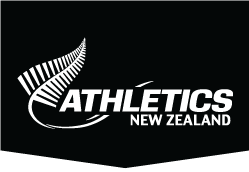News & Updates
Ninety Not Out

High-respected New Zealand coaching stalwart Russ Hoggard celebrated his 90th birthday last weekend. Steve Landells spoke to the man with more than 60 years of coaching experience about his life and times in the sport.
Just what is about New Zealand and nonagenarian athletics coaches?
Arch Jelley – now aged 97 – memorably guided middle-distance runner Hamish Carson to the 2016 Rio Olympics and now Russ Hoggard is the latest active track and field coach to toast his 90th birthday.
Short in stature but bubbling with energy and enthusiasm, Russ, who works five days a week from noon until 7pm as programme development manager for the North Sport Academy could pass for a man a good ten years younger.
Boasting more than six decades of coaching expertise and having guided athletes to numerous Olympic Games, World Championships and Commonwealth Games there is very little the West Aucklander has not experienced in the sport, but why has he remained wedded to the sport for so long?
“Longevity is just something that happens, isn’t it? Russ explains. “I just like it, just like I enjoy a glass of wine with my dinner every night. It’s then bed, and the next day its athletics, go.”
Athletics Switch
Born in 1929, Russ began his sporting life as a cyclist, winning a national track silver medal in the tandem as a member of the Lyndale Athletic and Cycling Club in New Lynn, West Auckland.
Yet his sporting career was to take a sudden turn following the screening in Auckland in 1950 of a four-hour long documentary of the 1936 Berlin Olympics.
“The film was amazing, they documented everything from cycling, swimming, equestrian, every sport at the Games,” he explains. “I must have seen the film three or four times at a movie theatre on K (Karangahape) Road (in Auckland) and I got hooked watching the athletics.”
Inspired to take up track and field he joined the Western Suburbs Athletic Club and so began his near 70-year association with the sport.
Competing in the 1950s he developed into a good sprinter, making New Zealand finals in 400m (or back then the 440yd). For the final two years of his career he took up the triple jump on the back of encouragement from five-time Commonwealth Games representative Dave Norris and 1966 Commonwealth decathlon champion Roy Williams and claimed top six finishes in his new-found event.
“I could no longer hack the workload in the sprints but then I found out that triple jump entailed just as much bloody work,” he says with a laugh.
Russ’ coaching journey began by chance. Long jumper Beverly Weigel, had represented her country at the age of 16 in the 1956 Melbourne Olympics in the long jump and the following year set a world junior record mark of 6.23m.
Beverly was coached by Jim Bellwood, the man who had guided Yvette Williams to the 1952 Olympic long jump title, when Russ was presented with an unexpected opportunity.
“Bev has developed a split bursa on the heel which is a common problem for jumpers,” he explains. “For some reason Jim did not think there was anything wrong with her and the problem got worse when Bev’s dad said ‘could I give Bev a hand as coach?’ I thought, why is she walking away from a man who guided an athlete to an Olympic gold medal and world record? But it obviously wasn’t working and the dad asked me could I get her on her feet again.”
Russ agreed and successfully guided Bev to the 1960 Rome Olympics, where she finished tenth. He also started coaching her younger sister, Pam, who competed at the 1958 Cardiff Commonwealth Games.
Quickly attracted to the nuances of coaching he was to enjoy more success guiding sprinter Brenda Matthews to the 1972 Munich Olympics, Sue Haden to the 1974 Commonwealth Games 800m silver medal and Carlene Dillimore to multiple New Zealand titles and the 1990 Commonwealth Games, where she competed in the 4x400m and 800m.
Coaching Philosophy
Coaching for more than six decades, Russ has guided the careers of hundreds of athletes and today he works with a group of a round dozen – while setting schedules for numerous others – out of the North Harbour Bays club led by New Zealand 400m hurdles record-holder and two-time World Championship representative Portia Bing and Amy Robertson, the 2019 New Zealand 100m hurdles bronze medallist.
Supported by Tony Catchpole, who specifically works on the mechanics of the athletes “my muscles are a bit old for coaching mechanics these days” – Russ is still a regular at AUT Millennium with stopwatch in hand, driving the coaching programme with the passion and enthusiasm of a man half his age.
“Our theory is if you are aged 13 or over, come and train with us twice a week to see if you like it or not,” explains Russ. “There are many obstacles as a coach you need to get around, through or over. The coach has to understand the athlete, get them to mix with the rest of the training group. A coach has to be available for an athlete and get inside the athlete’s head. But I think it is also important the athlete also gets inside the coach’s head and many athletes don’t take too well to that.”
Yet he believes coaching and athletics is often over-complicated and there is no substitute for hard work.
“I always say when the gun goes the bull shit stops,” he explains. “You have to put in the work before the event. I also say as a coach you should never cross an athlete off because you don’t think they are good enough. Steve Erkkila is a classic example. Steve won four national titles (three in the 100m and one 200m gold) and also made the 1977 World Cup 4x400m team for Oceania. His mechanics were so bad when he started working with me, Dave Norris and I joked he must be the only athlete to ever break 50 seconds for the 400m running on his heels. But he was a tremendous capacity for hard work and achieved a lot in his career.”
Changing Times
Coaching groups of athletes brings with it a big responsibility. And part of Russ’ strength is knowing his limitations. If he believes an athlete is better suited elsewhere he will quite readily recommend that coach.
Over the years he coached sprints, hurdles, middle-distance, jumps and multi-events, he is one of a dying breed of “generalist” coaches so what is the secret to his success?
“I’m not really one for coaching seminars and I believe I’ve learned so much more from the athletes,” he explains. “I also think that over time I’ve learned what not to do rather than what to do. I’ve got a critical eye for seeing other coaches at work. I sometimes see them doing things wrong, but, of course, it is none of my business, so I never tell them unless they ask!”
After a connection with the sport spanning almost 70 years, Russ has also seen many changes.
Media and public appetite for the sport has waned and he believes more work needs to be done to attract more youngsters into the sport.
Athletics Joy
Yet for Russ coaching has offered a lifeline to a better world. The former retail worker has survived the personal strife of divorce and bankruptcy but is a happier more content man when returning to the sanctuary of the athletics track.
“It is like an addiction,” he says of coaching. “I’ve had some troubles but coming down to the track has been like getting in a warm bath where those troubles disappear. Then when I get back to ‘normal life’ I feel like I can cope better.
Yes, at the age of 90, Russ is showing no signs of ending his coaching commitments.
“I’m fitted with a pacemaker and I have a benign tremor which effect my balance but track and field is wonderful. If I could package it and sell it I would earn a fortune.”
